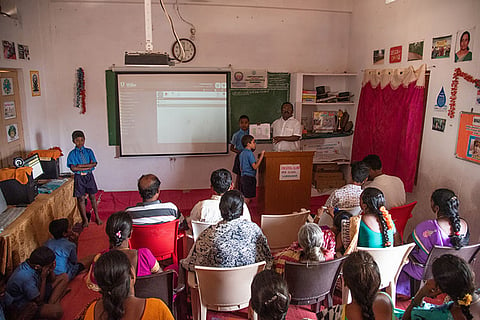

The Andhra Pradesh government’s decision to make English the compulsory medium of instruction in all government schools has been controversial right from the start, inviting heavy criticism from several quarters. And now, the government has decided to rope in the children’s parents, asking them to vote on the matter.
Schools in Andhra Pradesh have been instructed to ask parents to vote by filling out a simple form, where they can choose between two options -- ‘English medium with Telugu as a compulsory subject’ or ‘Telugu medium.’
The Jagan Mohan Reddy government had gone ahead with its decision, despite criticism, issuing orders and making preparations through bridge courses for students and special training for teachers who would be switching from Telugu medium to English medium.
In December, the High Court had questioned the state government over the legality of the move to make English medium mandatory. The government has now decided to invite the opinions of the parents of children studying in government schools on the matter.
Although there has been sustained opposition against the move for months, the timing of the opinion-gathering process, a week before the next court hearing on the matter on January 27, is being questioned.
The controversy
The decision to make English medium instruction mandatory had led to widespread debates in the Telugu-speaking states about the harmful consequences of such a move on the preservation of the Telugu language. Some groups also criticised the government for taking such a huge step without sufficient groundwork, while others complained that the move could adversely affect poor children and lead to dropouts.
The criticism has been countered by many, particularly Dalit groups, who argued that access to English medium education is a step towards increased opportunities for children from socio-economically disadvantaged communities, bringing them closer to a level playing field with students from private, English medium schools.
While the government had issued an order in November that English medium would be introduced from class 1 to 8 in all government schools from the academic year 2020-21, after continued opposition, it was soon announced that only classes 1 to 6 would be converted to English medium in the first phase, adding one class to English medium in each subsequent year.
In December, the High Court objected to the move while hearing two separate PILs challenging the government order. The petitioners had argued that the move was a violation of the RTE Act and that children and parents must have the right to select their medium of instruction. The court has asked the government to file a counter-affidavit spelling out the reason for the move. The next hearing will be on January 27, and the bench will be making the final decision in the matter. The parents’ votes have been taken on Tuesday, less than a week before the hearing.
Is this a hasty way to involve parents?
Commissioner of School Education for Andhra Pradesh V Chinaveerabhadrudu says that the vote is part of the ongoing process for implementation of English medium.
“We do not have much time left. The government cannot finalise the decision in May and introduce English medium in June. Parents’ committees have already met on January 7 where this matter was also discussed. We now want to take parents’ opinion as well,” he said.
The headmaster of a Vijayawada government school told TNM that while most parents seem inclined towards English medium, it is likely that the state education department wanted to gather evidence to produce in court, to establish the legality of the move and the consent of parents.
“Earlier in January, we held a parents’ committee meeting, where we told parents about the various schemes like Amma Vodi (financial assistance for mothers of poor school-going children), Nadu-Nedu (school infrastructure development), Jagananna Goru Mudda (revamped of mid-day meals) and Vidya Kanuka (student kits at the start of the school year), as well as English medium. On Tuesday, we asked students to get the form filled and signed by their parents. We have handed over the final number of votes to the Zonal Education Office. This way, the numbers are on paper and can serve as proof,” he said.
However, it’s not only the timing of seeking parents’ involvement - which appears hasty and tokenistic - which is being questioned but the very method of involving parents through a quick, binary vote. A large amount of polarising information is being spread about the pros and cons of English medium, and education activist Prof Haragopal says that it is more productive to engage with parents while giving them more information and clarifying any questions.
“While it is true that there is a dichotomy where it’s mostly the disadvantaged students studying in Telugu medium, there are many issues with implementing English medium as well. There are many other problems with government schools other than the medium of instruction alone. Taking parents’ feedback is a democratic process and needs to be done, but this may not be the right way,” he says.
While parents’ committees have recently discussed the issue, Haragopal says that involving independent experts who can provide reliable information and engage with parents before seeking their opinion could have been a more fruitful way of seeking parents’ opinion.